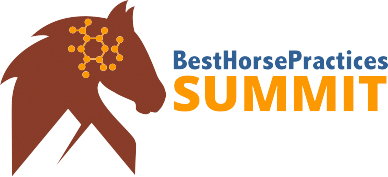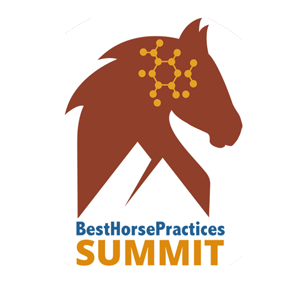Closing Remarks
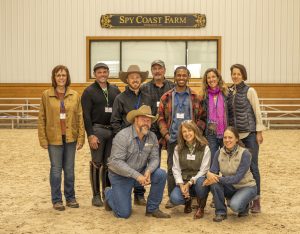
2022 presenters
Editor’s Note: The following remarks were delivered by Best Horse Practices Summit director, Maddy Butcher, at the close of the 2022 Summit in Lexington, Kentucky.
One thing attendees remark on at the Summit is that there are a lot of connections and dovetailing being made between presentations. Presenters reference each other’s presentations and tie ideas and concepts to one another.
How does that happen?
I think Daniel Dauphin would say, well, heck, we just threw it together overnight after scrolling through Facebook. But in fact, we did some research and interviewing and had a lot of back and forths; we like presenters who are relatively unemcumbered by their egos. We want the conference to have a holistic feel to it and that we recruit presenters and craft the program accordingly.
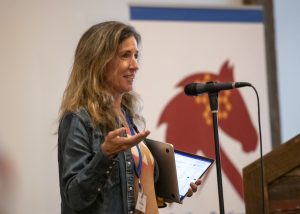
Katrin Silva tells her story during our incredible Storytelling Session, Saturday evening.
Like horse work, it’s easy if you have a feel for it and aren’t afraid to make mistakes. What does feel mean in the context of putting on a conference? It means recognizing that best horse practices root themselves in basic, universal tenants. This foundational stuff can be roughly summarized by the idea “treat a horse like a horse.” That’s what we’re after. It’s something that is written into our mission statement and which you can find on our website.
It’s these simple-but-not-easy tenants that guided me when we established the very first Summit, which I nicknamed the Silver Lining Summit. Seven years ago, I’d just come from an expo where I was seeing sooo much stuff that was antithetical to what I knew to be in the best interest of the horse. I came home weary and depressed. The Silver Lining is that a bunch of us said, “let’s not be part of the problem. Let’s be part of the solution.” That is how the Best Horse Practices Summit was born.
It’s quite amazing that Summiteers are not only from all over the country, but are all over the place when it comes to background and specific passions: Western, English, wild horses, rescues, therapeutic work, performance, sport, ranch versatility. AND, that you are networking and sharing with folks who probably don’t do what you do. That’s a really powerful thing and part of what we have come to know as the Summit experience.

Nahshon Cook
Nowadays, consensus is a rare commodity. There’s little consensus on covid. There is little consensus on the best bourbon, except that it’s from Kentucky of course. But I think, after a weekend like this, we can come closer to having or knowing or sensing a consensus on best practices.
This year and this weekend, I’ve come to learn more and more that best practices really really comes down to who we are as people, humans navigating our lives in this world with other two legged beings and our four legged beings. The troubles, struggles, traumas, braces, denials, blind spots, vulnerabilities, injuries, prejudices that WE have – consciously or not – directly impact horses’ wellness.
Some conversations this year and this weekend, have touched on mental health, have touched on ageism and sexism, have touched on inclusion and diversity or lack thereof. Do these conversation fit under the Best Horse Practices Summit? Yes, I think they do. How we step up to that challenge remains to be seen, so stay tuned. Or better yet, be part of our question-answering process. Stay in touch. Get involved.
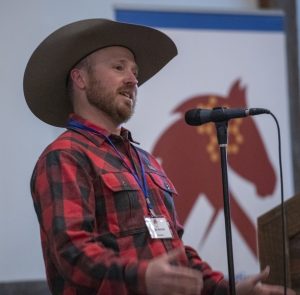
Josh Nichol
To that end, please participate in the survey which we will send out via email soon. You can contact me directly through our website and I would love to hear from you. Probably not now, but November would be good.
Thanks go to the board, volunteers, attendees and our sponsors – especially Lucerne Farms – for supporting the effort of building something from scratch, of putting something out into the universe that we think horses would appreciate. We are so very glad you have joined us. We consider the Summit a conference, yes, but it’s also a movement. I think the horses would thank us.
